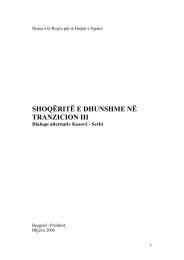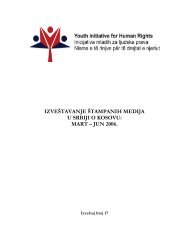Implementation of Transitional Laws in Serbia 2006
Implementation of Transitional Laws in Serbia 2006 - Archive
Implementation of Transitional Laws in Serbia 2006 - Archive
- No tags were found...
You also want an ePaper? Increase the reach of your titles
YUMPU automatically turns print PDFs into web optimized ePapers that Google loves.
<strong>Implementation</strong> <strong>of</strong> <strong>Transitional</strong> <strong>Laws</strong> <strong>in</strong> <strong>Serbia</strong> <strong>2006</strong>Conscientious ObjectionArticle 45No person shall be obliged to perform military or any other service <strong>in</strong>volv<strong>in</strong>g the use <strong>of</strong> weaponsif this opposes his religion or beliefs.Any person plead<strong>in</strong>g conscientious objection may be called upon to fulfill military duty withoutthe obligation to carry weapons, <strong>in</strong> accordance with the law.The regulation concern<strong>in</strong>g the Objection <strong>of</strong> Conscience is another classiccase <strong>of</strong> the reduction <strong>of</strong> the achieved level <strong>of</strong> human rights. Althoughthis regulation had been copied from the small Charter, Paragraph two <strong>in</strong>which it was stated that a person plead<strong>in</strong>g objection <strong>of</strong> conscience can becalled to fulfill an appropriate civil service as regulated by the law, hadbeen changed 96 . In the new Constitution, the term „civil service“ had beenreplaced by „army obligation“. While the <strong>in</strong>tention <strong>of</strong> the framers <strong>of</strong> theconstitution is unclear, it is extremely important that they omitted the words„civil service“.The right to the objection <strong>of</strong> conscience is a right which enables a person toexchange their military obligation with serv<strong>in</strong>g <strong>in</strong> the civil service, not onlywithout weapons, but also without serv<strong>in</strong>g <strong>in</strong> military objects, <strong>in</strong>stitutionsor services. This is also clearly regulated by <strong>in</strong>ternational documents whichprotect the right to the objection <strong>of</strong> conscience. This right had beenregulated <strong>in</strong> 1967 by the Parliamentary Assembly Resolution <strong>of</strong> the Council<strong>of</strong> Europe number 337 97 , and later confirmed by the Recommendations476 (1967) and 816 (1977) <strong>of</strong> the Parliamentary Assembly <strong>of</strong> the Council<strong>of</strong> Europe, as well as Recommendation R (87) 8 on the right to an objection<strong>of</strong> conscience to military service which was adopted by the Committee <strong>of</strong>M<strong>in</strong>isters <strong>of</strong> the Council <strong>of</strong> Europe 98 .By regulat<strong>in</strong>g the right to the objection <strong>of</strong> conscience <strong>in</strong> this way, <strong>Serbia</strong> hasreturned to the solution which was relevant to the Law on the army from2002 99 , and which was criticized by both the local public and experts and<strong>Serbia</strong> and Montenegro 2005, Belgrade, <strong>2006</strong>, as well as on the website: www.forum18.org96 Article 28, Paragraph 2 <strong>of</strong> the Small Charter, see above under 3697 Article 1 <strong>of</strong> the Resolution 337 <strong>of</strong> the Council <strong>of</strong> Europe98 The translations <strong>of</strong> all the documents are available <strong>in</strong> the book by the Lawyers’ Committee for Human Rights:Objection <strong>of</strong> Conscience, Belgrade, 200099 The law on changes and additions to the law on Yugoslav Army, Official Gazette <strong>of</strong> SRJ number 3/200227











